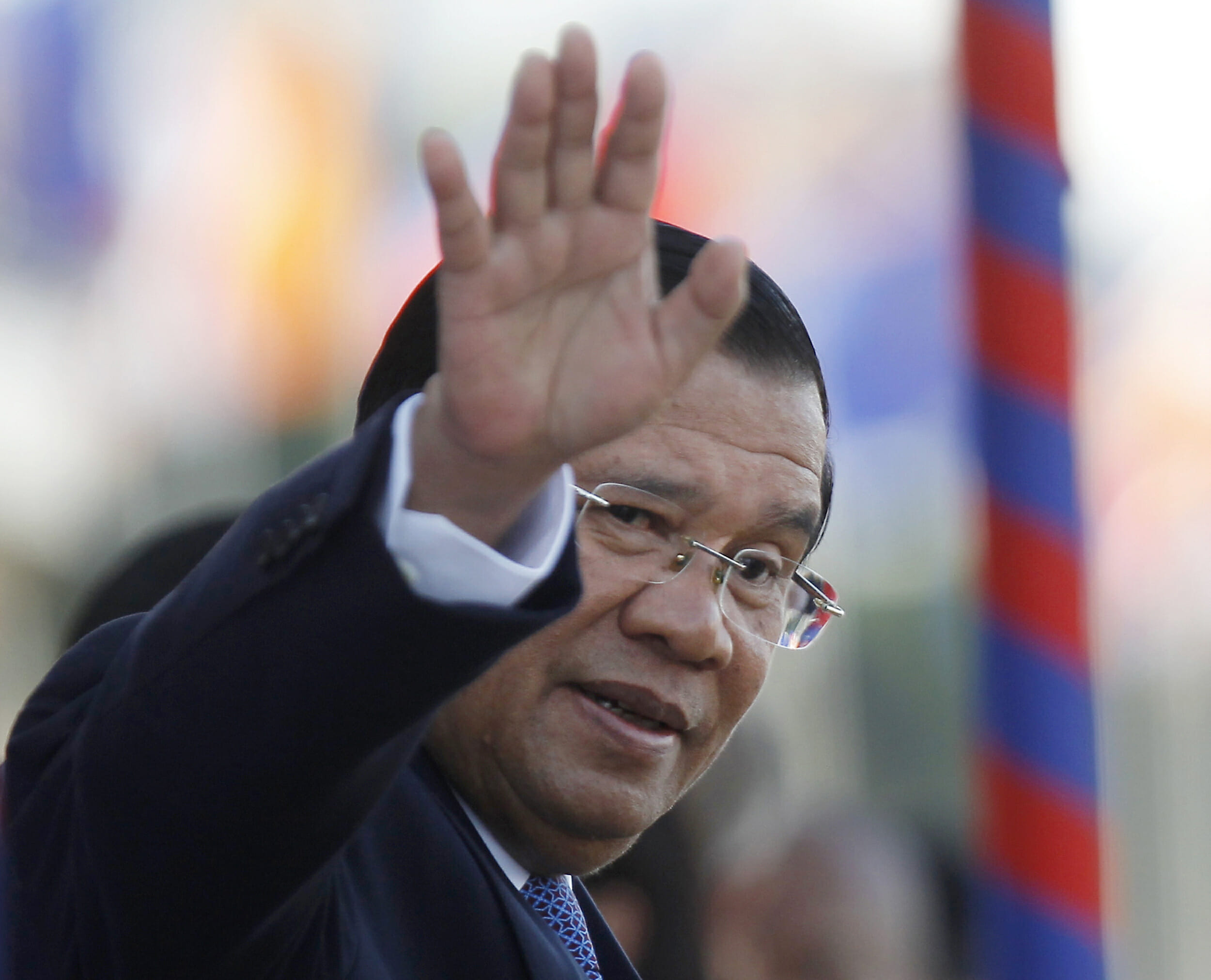
Cambodian leader flips the script on opponents' noodle ploy
PHNOM PENH, Cambodia (AP) — The bitter rivalry between Cambodian strongman Hun Sen and his self-exiled chief political rival Sam Rainsy has sometimes played out in deadly violence. But on Sunday, soup rather than blood was likely to be spilled.
The two titans of Cambodian politics normally agree over nothing but made stunningly similar calls to their followers this past week. They both said all Cambodians should gather with their neighbors on Sunday and sit for a meal of num banh chok, a popular Cambodian rice noodle soup usually eaten at breakfast.
From his prime minister’s perch of unchallenged authority, Hun Sen promoted eating “the Khmer (Cambodian) noodles of unity and solidarity.” Sam Rainsy, co-founder of the country’s only credible but now disbanded political party, called for “eating Khmer noodles for the sake of friendship in the framework of the entire, giant Cambodian family.”
Both encouraged sharing the meal with folks from the other side of the political fence.
It sounds utopian, but its roots are in hard-nosed politics.
The Cambodia National Rescue Party was dissolved by the Supreme Court in 2017 in what was widely seen as a maneuver to ensure victory by Hun Sen’s Cambodian People’s Party in the 2018 general election. The 118 opposition lawmakers were kicked out of Parliament and banned from any political activity for five years.
Former party members were left at loose ends. Many of its leaders fled the country, fearing arrest. Even those in local political positions were booted from their jobs.
Sin Rozeth had been an admired young CNRP commune chief in the northwestern province of Battambang. Forced out of politics, she opened a shop selling Cambodian noodles. Her old colleagues would drop by for a meal and chat about politics, and she and others would post their thoughts on Facebook.
Their comments about Sam Rainsy drew the attention of authorities. A court called in Sin Rozeth and about three dozen colleagues for questioning, citing their noodle soup meals as political gatherings in violation of the Supreme Court ban on political activity.
Matters escalated.
According to Human Rights Watch, authorities this year have issued at least 147 arbitrary court and police summonses against members or supporters of the Cambodia National Rescue Party. “Summons seen by Human Rights Watch lacked legal specifics, containing only vague references to allegations that the person summoned may have violated the Supreme Court ruling that dissolved the CNRP in November 2017,” the rights group said.
Soon, word spread that the former CNRP leaders wanted their party members to gather where they could on Sunday and eat the kind of noodles Sin Rozeth sold in her shop — a novel act of political solidarity.
Hun Sen, known for his prowess in chess, quickly countered, sending word down to his party members that they should also gather on Sunday to eat noodle soup: “Please don’t forget to eat Khmer noodles together. These are the Khmer noodles of unity and solidarity, not destructive noodles.” Hun Sen also suggested that the activity could kick off a campaign to promote Cambodian food and culture.
Effectively co-opted, Sam Rainsy, interviewed by The Associated Press in Paris, said his party had forced Hun Sen’s hand with its bid to make a show of strength.
“Since people eat noodles all over the country, Hun Sen may first accuse them of being opposition supporters, but after seeing such a tide, so many people joining the noodle parties, Hun Sen said no, we cannot stop these noodle parties. If you can’t beat them, join them,” Sam Rainsy said.
At a Buddhist temple in Phnom Pehn, Hun Sen’s party set up tables on a stage for about 300 people. As they eagerly slurped the breakfast noodle soup and chatted with one another, some confessed they were unaware of or didn’t care for the event’s political undertones. Others quoted the prime minister’s message of solidarity and national unity.
“I have been eating the Khmer noodles since I was young,” said Pov Tha, 43. “I did not hear their appeals but I saw many people eating for free and then I joined them.”
Sam Rainsy speculated that the action might improve the political atmosphere.
“I think this may be a good sign. A good start to come to some kind of understanding between the ruling party and the opposition, so that the ruling party becomes more tolerant and accepts the very existence of an opposition,” he said.
However, Hun Sen denied any such prospect.
“Please don’t take what I said to be analyzed outside the intention of eating Khmer noodles, as some people think that it is a step toward negotiations (with the CNRP),” Hun Sen said at a graduation ceremony Thursday in Phnom Penh, Cambodia’s capital, according to the English-language Phnom Penh Post.
“Don’t be confused,” he said. “I’m talking purely about Khmer noodles and solidarity, about national unity through the eating of Khmer noodles on June 9.”
___
Associated Press journalists Grant Peck in Bangkok and Nadine Achoui-Lesage in Paris contributed to this report.
The Western Journal has not reviewed this Associated Press story prior to publication. Therefore, it may contain editorial bias or may in some other way not meet our normal editorial standards. It is provided to our readers as a service from The Western Journal.
Truth and Accuracy
We are committed to truth and accuracy in all of our journalism. Read our editorial standards.
Advertise with The Western Journal and reach millions of highly engaged readers, while supporting our work. Advertise Today.












